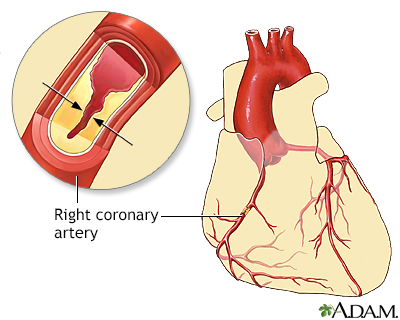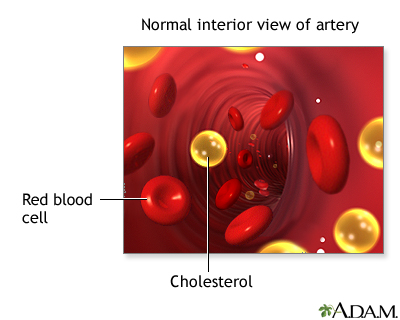Pregnancy SmartSiteTM
Cholesterol - high; Lipid disorders; Hyperlipoproteinemia; Hyperlipidemia; Dyslipidemia; Hypercholesterolemia DefinitionCholesterol is a fat (also called a lipid) that your body needs to work properly. Too much bad cholesterol in your blood can increase your chance of getting heart disease, stroke, and other problems. Common medical terms for high blood cholesterol are lipid disorder, hyperlipidemia, or hypercholesterolemia, with the last being the most precise. CausesThere are many types of cholesterol. The ones talked about most are:
For many people, abnormal cholesterol levels are partly due to lifestyle choices. This often includes eating a diet that is high in fat. Other lifestyle factors are:
Some health conditions can also lead to abnormal cholesterol, including:
Medicines such as certain birth control pills, diuretics (water pills), beta-blockers, and some medicines used to treat depression may also raise cholesterol levels. Several disorders that are passed down through families lead to abnormal cholesterol and triglyceride levels. They include:
Smoking does not cause higher cholesterol levels, but it can reduce your HDL (good) cholesterol. Exams and TestsA cholesterol test is done to diagnose a lipid disorder. Different experts recommend different starting ages for adults.
It is important to work with your health care provider to set your cholesterol goals. Newer guidelines steer providers away from targeting specific levels of cholesterol. Instead, they recommend different treatments or medicines and doses depending on a person's history and risk factor profile. These guidelines change from time to time as more information from research studies becomes available. General targets are:
If your cholesterol results are abnormal, you may also have other tests such as:
TreatmentSteps you can take to improve your cholesterol levels and to help prevent heart disease and a heart attack include:
Your provider may want you to take medicine for your cholesterol if lifestyle changes do not work. This will depend on:
You are more likely to need medicine to lower your cholesterol:
Almost everyone else may get health benefits from LDL cholesterol that is lower than 160 to 190 mg/dL (4.14 mmol/L to 4.92 mmol/L). There are several types of medicines to help lower blood cholesterol levels. The medicines work in different ways. Statins are one kind of drug that lowers cholesterol and has been proven to reduce the chance of heart disease. Other medicines are available if your risk is high and statins do not lower your cholesterol levels enough. These include ezetimibe and PCSK9 inhibitors. Outlook (Prognosis)High cholesterol levels can lead to hardening of the arteries, also called atherosclerosis. This occurs when fat, cholesterol, and other substances build up in the walls of arteries and form hard structures called plaques. Over time, these plaques can block the arteries and cause heart disease, stroke, and other symptoms or problems throughout the body. Disorders that are passed down through families often lead to higher cholesterol levels that are harder to control. ReferencesAmerican Diabetes Association Professional Practice Committee. 10. Cardiovascular disease and risk management: standards of care in diabetes-2025. Diabetes Care. 2025;48(Supplement_1):S207-S238. PMID: 39651970 pubmed.ncbi.nlm.nih.gov/39651970/. Arnett DK, Blumenthal RS, Albert MA, et al. 2019 ACC/AHA Guideline on the primary prevention of cardiovascular disease: executive summary: a report of the American College of Cardiology/American Heart Association Task Force on Clinical Practice Guidelines. Circulation. 2019;140(11):e563-e595. PMID: 30879339 pubmed.ncbi.nlm.nih.gov/30879339/. Genest J, Mora S, Libby P. Lipoprotein disorders and cardiovascular disease. In: Libby P, Bonow RO, Mann DL, Tomaselli GF, Bhatt DL, Solomon SD, eds. Braunwald's Heart Disease: A Textbook of Cardiovascular Medicine. 12th ed. Philadelphia, PA: Elsevier; 2022:chap 27. Grundy SM, Stone NJ, Bailey AL, et al. 2018 AHA/ACC/AACVPR/AAPA/ABC/ACPM/ADA/AGS/APhA/ASPC/NLA/PCNA guideline on the management of blood cholesterol: executive summary; a report of the American College of Cardiology/American Heart Association Task Force on Clinical Practice Guidelines. J Am Coll Cardiol. 2019;73(24):3168-3209. PMID: 30423391 pubmed.ncbi.nlm.nih.gov/30423391/. Robinson JG. Disorders of lipid metabolism. In: Goldman L, Cooney KA, eds. Goldman-Cecil Medicine. 27th ed. Philadelphia, PA: Elsevier; 2024:chap 190. US Preventive Services Task Force; Mangione CM, Barry MJ, et al. Statin use for the primary prevention of cardiovascular disease in adults: US Preventive Services Task Force Recommendation Statement. JAMA. 2022;328(8):746-753. PMID: 35997723 pubmed.ncbi.nlm.nih.gov/35997723/. US Preventive Services Task Force; Barry MJ, Nicholson WK, et al. Screening for lipid disorders in children and adolescents: US Preventive Services Task Force Recommendation Statement. JAMA. 2023;330(3):253-260. PMID: 37462699 pubmed.ncbi.nlm.nih.gov/37462699/. | ||
| ||
Review Date: 1/1/2025 Reviewed By: Michael A. Chen, MD, PhD, Associate Professor of Medicine, Division of Cardiology, Harborview Medical Center, University of Washington Medical School, Seattle, WA. Also reviewed by David C. Dugdale, MD, Medical Director, Brenda Conaway, Editorial Director, and the A.D.A.M. Editorial team. View References The information provided herein should not be used during any medical emergency or for the diagnosis or treatment of any medical condition. A licensed medical professional should be consulted for diagnosis and treatment of any and all medical conditions. Links to other sites are provided for information only -- they do not constitute endorsements of those other sites. No warranty of any kind, either expressed or implied, is made as to the accuracy, reliability, timeliness, or correctness of any translations made by a third-party service of the information provided herein into any other language. © 1997- A.D.A.M., a business unit of Ebix, Inc. Any duplication or distribution of the information contained herein is strictly prohibited. | ||


 Cholesterol produc...
Cholesterol produc... Coronary artery di...
Coronary artery di... Cholesterol
Cholesterol Developmental proc...
Developmental proc...
